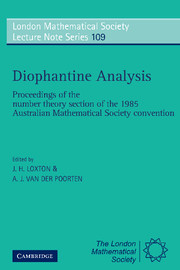 Diophantine Analysis
Diophantine Analysis Book contents
- Frontmatter
- Contributors
- Contents
- Introduction
- 1 An “ideal” transcendence measure
- 2 Galois orbits on abelian varieties and zero estimates
- 3 Small solutions of congruences with prime modulus
- 4 Newton polyhedra and solutions of congruences
- 5 On prime factors of sums of integers II
- 6 An introduction to continued fractions
- 7 Search for the three-dimensional approximation constant
- 8 Inverse problems for Mahler's measure
- 9 Large Newman polynomials
9 - Large Newman polynomials
Published online by Cambridge University Press: 05 April 2013
- Frontmatter
- Contributors
- Contents
- Introduction
- 1 An “ideal” transcendence measure
- 2 Galois orbits on abelian varieties and zero estimates
- 3 Small solutions of congruences with prime modulus
- 4 Newton polyhedra and solutions of congruences
- 5 On prime factors of sums of integers II
- 6 An introduction to continued fractions
- 7 Search for the three-dimensional approximation constant
- 8 Inverse problems for Mahler's measure
- 9 Large Newman polynomials
Summary
INTRODUCTION
Campbell, Ferguson and Forcade [2] have defined a Newman polynomial P(z) to be one with all coefficients either 0 or 1 and with P(0) = 1. Let m(P) denote the minimum of ∣P(z)∣ on the unit circle and let μi(n) be the maximum of m(P) attained for a Newman polynomial of degree n.
The authors [2] exhibited a Newman polynomial P12 of degree 12 with m(P12) > 1. answering a question of D.J. Newman. They computed μ(n) for n ≤ 20 and announced that μ(n) ≤ 1 for n ≤ 11 while μ(n) > 1 for 12 ≤ n ≤ 20 They conjectured that there is a sequence Pn of Newman polynomials for which m(Pn) → ∞, and also that μ(n) > 1 for all n ≥ 12.
The first conjecture was established by Smyth [7], who also showed that μ(n) > 1 for all n ≥ 2194.
In section 2, we give the proof of a strengthening of the first conjecture, namely that μ(n) ≫ nα for a certain constant α with.137 < α ≤ 1/2.
In the remaining sections, we complete the proof that μ(n) > 1 for all n ≥ 12. Note that Smyth's result reduces this proof to a “finite” amount of computation. since there are only 22193 Newman polynomials of degree less than 2194. One of the main points of our paper is to show how this computation can be reduced to a reasonable size.
Information
- Type
- Chapter
- Information
- Diophantine AnalysisProceedings at the Number Theory Section of the 1985 Australian Mathematical Society Convention, pp. 159 - 170Publisher: Cambridge University PressPrint publication year: 1986
Accessibility standard: Unknown
Why this information is here
This section outlines the accessibility features of this content - including support for screen readers, full keyboard navigation and high-contrast display options. This may not be relevant for you.Accessibility Information
- 1
- Cited by